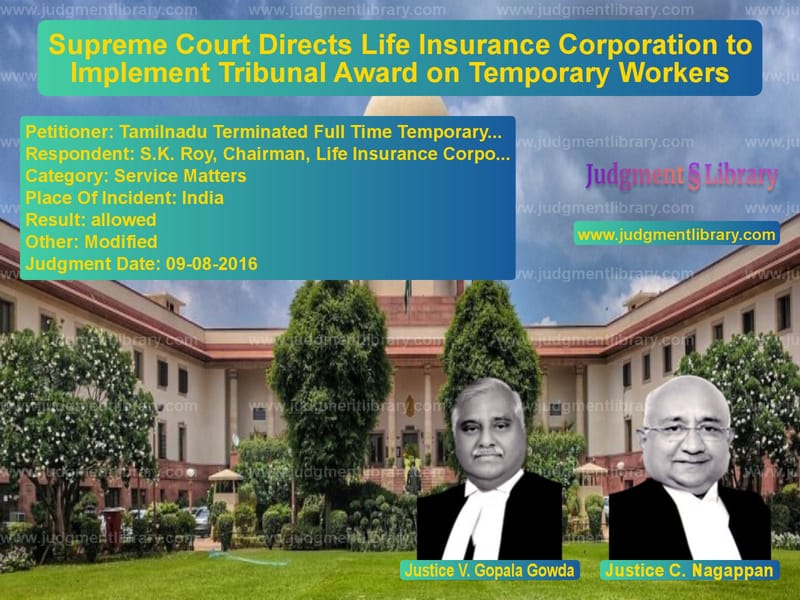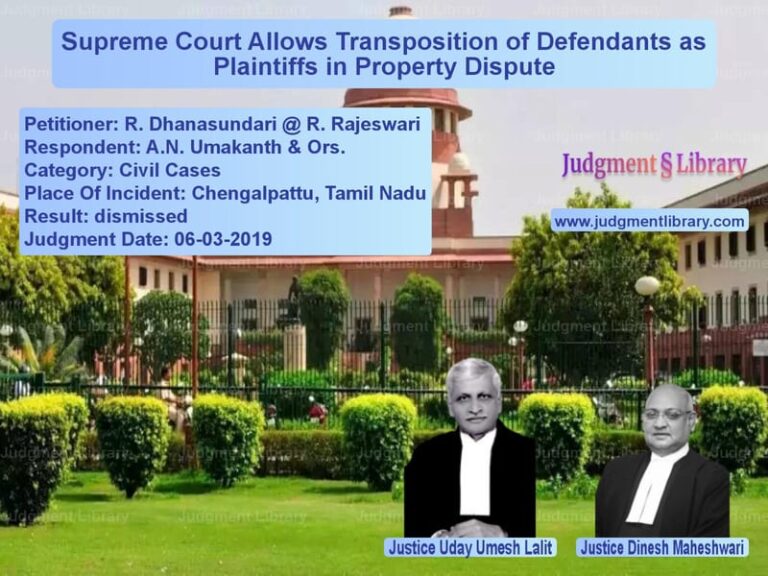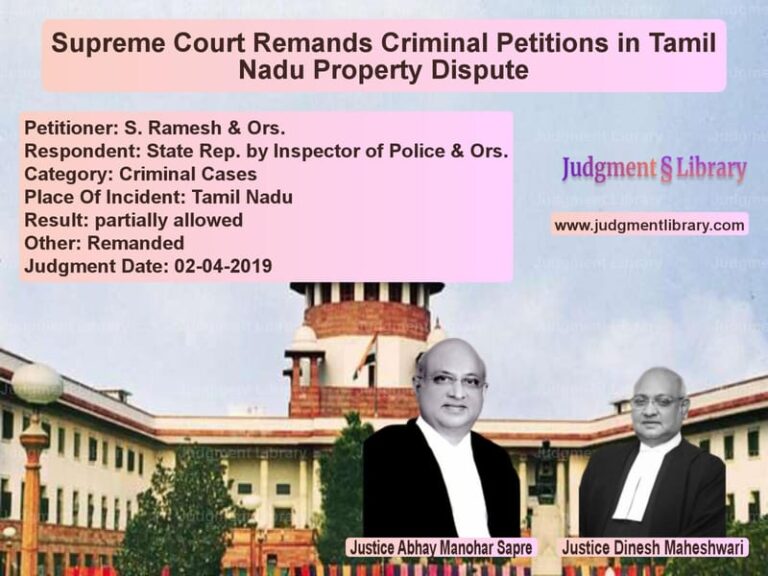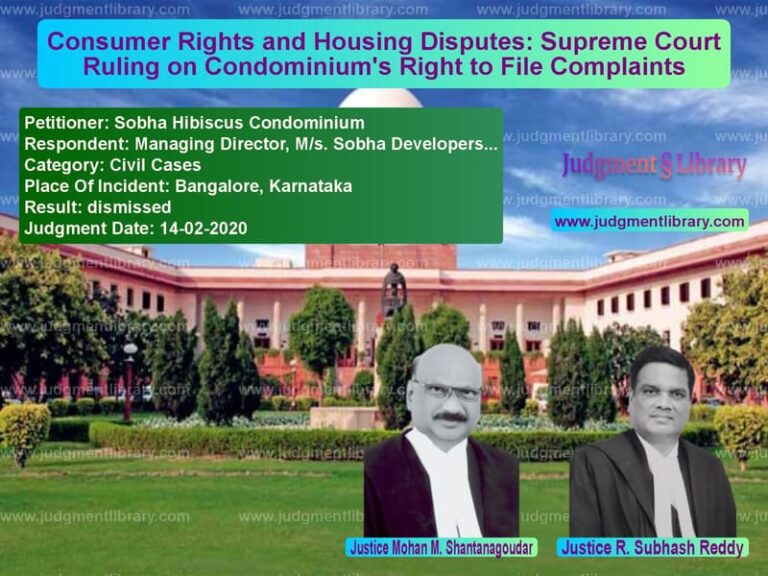Supreme Court Directs Life Insurance Corporation to Implement Tribunal Award on Temporary Workers
The case of Tamilnadu Terminated Full Time Temporary LIC Employees Association v. S.K. Roy, Chairman, Life Insurance Corporation of India involved a dispute over the regularization and employment benefits of temporary workers in the Life Insurance Corporation of India (LIC). The Supreme Court, in its judgment dated August 9, 2016, upheld the ruling of the Central Government Industrial Tribunal (CGIT), directing LIC to absorb the affected employees into permanent positions and provide them with back wages.
Background of the Case
The petitioners were temporary workers who had been engaged with LIC for several years. The dispute originated from Industrial Dispute No. 27 of 1991, where the Central Government Industrial Tribunal (CGIT) ruled that LIC must absorb the concerned workmen into permanent positions and provide all consequential benefits, including revised pay scales for those who had reached the age of superannuation.
LIC, however, failed to implement the CGIT’s award, leading to contempt petitions being filed in the Supreme Court. The issue was whether LIC was bound to comply with the CGIT’s decision or whether prior agreements and settlements precluded these temporary employees from being absorbed into permanent positions.
Legal Issues
The Supreme Court was required to address the following questions:
- Whether LIC was legally obligated to implement the CGIT’s award.
- Whether previous settlements between LIC and employees overrode the tribunal’s ruling.
- Whether financial constraints could justify LIC’s refusal to absorb the employees.
- Whether the court had the authority to direct specific compliance with the CGIT award.
Petitioner’s Arguments (Tamilnadu Terminated Full Time Temporary LIC Employees Association)
The petitioners argued:
- The CGIT award was legally binding, and LIC was in contempt for failing to comply.
- LIC had engaged the petitioners for several years, making their work essential and rendering them eligible for permanent employment.
- The failure to implement the award caused severe financial hardship to the affected workers.
- The High Court had no jurisdiction to override the tribunal’s ruling.
Respondent’s Arguments (Life Insurance Corporation of India)
LIC contended:
- The 1989 settlements between LIC and employee unions superseded the CGIT award.
- The financial burden of absorbing these employees would be excessive, affecting LIC’s policyholders.
- LIC did not receive funds from the Central Government, and thus its financial decisions were constrained by internal revenue generation.
- The High Court had correctly ruled that LIC was not obligated to implement the CGIT award.
Supreme Court’s Observations and Ruling
1. LIC’s Financial Constraints Are Not a Justification for Non-Compliance
The Court held that financial difficulties did not excuse LIC from implementing a legally binding tribunal award:
“The contention that LIC has a huge surplus and is in a position to implement the order of this Court is misconceived as the same goes against the statutory provisions of the LIC Act, 1956.”
The Court acknowledged LIC’s financial concerns but ruled that it could not override its legal obligations.
2. Tribunal’s Decision Is Binding and Must Be Implemented
The Supreme Court reiterated that the CGIT’s ruling was final and binding:
“The Award passed by the CGIT is legal and valid and the same be restored and implemented by the Life Insurance Corporation of India by absorbing the concerned workmen in the permanent posts.”
This reaffirmed the principle that tribunal decisions must be honored unless overturned by a higher judicial authority.
3. Employees Were Performing Perennial Work and Deserved Regularization
The Court noted that the temporary employees had been performing essential tasks for extended periods:
“The affected employees had been rendering their service to the Corporation in the perennial nature of work for a number of years and hence, the High Court was not justified in interfering with the said Award passed by the CGIT.”
Since their work was continuous and necessary, they were entitled to permanent status.
4. Partial Relief Granted on Back Wages
While upholding the CGIT’s decision, the Supreme Court modified the quantum of back wages, considering LIC’s financial constraints:
“The temporary and badli workers of LIC, who are entitled for regularisation as permanent workmen, are held to be entitled to full back wages as well. However, keeping in mind the immense financial burden this would cause to LIC, we deem it fit to modify the relief only with regard to the back wages payable and therefore, we award 50% of the back wages with consequential benefits.”
Thus, the employees were awarded half their claimed back wages.
Final Verdict
The Supreme Court ruled:
- LIC must implement the CGIT award and absorb the temporary employees as permanent staff.
- 50% of back wages must be paid, calculated based on applicable periodic salary revisions.
- The modified award must be implemented within eight weeks.
- Contempt petitions would remain open for fresh filing if LIC failed to comply.
Key Takeaways
- Tribunal awards must be honored unless legally overturned.
- Employers cannot use financial constraints to evade legal obligations.
- Temporary employees performing continuous work are entitled to regularization.
- Courts may modify back wages based on financial considerations.
- Non-compliance with legal orders can result in contempt proceedings.
Impact of the Judgment
The ruling had significant implications for employment law and labor rights in India:
- It reinforced the legal authority of industrial tribunals.
- It protected the rights of long-serving temporary workers.
- It ensured that large corporations fulfill their legal obligations to employees.
- It set a precedent for modifying relief based on financial constraints.
In conclusion, the Supreme Court’s decision in Tamilnadu Terminated Full Time Temporary LIC Employees Association v. LIC reaffirmed the principle that tribunal decisions must be respected, ensuring justice for temporary employees seeking permanent employment.
Don’t miss out on the full details! Download the complete judgment in PDF format below and gain valuable insights instantly!
Download Judgment: Tamilnadu Terminated vs S.K. Roy, Chairman, Supreme Court of India Judgment Dated 09-08-2016-1741878465214.pdf
Direct Downlaod Judgment: Direct downlaod this Judgment
See all petitions in Employment Disputes
See all petitions in Judgment by V. Gopala Gowda
See all petitions in Judgment by C. Nagappan
See all petitions in allowed
See all petitions in Modified
See all petitions in supreme court of India judgments August 2016
See all petitions in 2016 judgments
See all posts in Service Matters Category
See all allowed petitions in Service Matters Category
See all Dismissed petitions in Service Matters Category
See all partially allowed petitions in Service Matters Category







